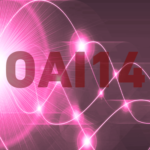The 14th OAI Workshop took place online 10-14 November 2025. Attendance was global, with librarians, IT staff, research officer staff, and academic researchers prominent among them. More than 1,400 people registered from 58 different countries / regions.
OAI14 Sessions
In 2000 the Open Archives Initiative (OAI) was still in its early stages. It was often still called the Santa Fe Convention, which refers to a meeting in October 1999 of representatives from a number of institutions that maintained or planned e-print archives for open access, and from organizations interested in providing services on the data in those archives (such as search interfaces). This convention was an initiative of Paul Ginsparg, Rick Luce and Herbert Van de Sompel (all three working at that time at the Los Alamos National Laboratory) and it resulted in an agreement about a technical and organizational framework for achieving interoperability among e-print archives.
The first European meeting on OAI took place in September 2000 in Lisbon, in conjunction with a meeting of the European Computer Driving Licence Foundation (ECDL), and therefore more oriented to computer specialists than to librarians. During the Annual General Conference of LIBER (Association of European Research Libraries) at the Royal Library in Copenhagen in July 2000, the Professional Division on Access suggested to organize a workshop on the Open Archives Initiative (OAI). They immediately grasped the great importance of the OAI and its possible impact on the processes of scholarly communication, and therefore indirectly also on research libraries.
OAI then became an established series of Workshops looking at developments in scholarly communication. These Workshops are held every 2 years (see the Previous OAI webpages for details). OAI meetings are one of the major meetings on Open Science and Scholarship in the year in which they are held. Their aim is to engage all stakeholders globally in the scholarly communications chain in debate and discussion around current developments and to identify new paths and ways to collaborate and share.
Open Science is a set of principles and practices that aim to make scientific research from all fields accessible to everyone for the benefit of scientists and society as a whole. Open Science is about making sure not only that scientific knowledge is accessible, but also that the production of that knowledge itself is inclusive, equitable and sustainable. The UNESCO Recommendation on Open Science provides an internationally agreed definition, as well as a set of shared values and guiding principles for Open Science.
